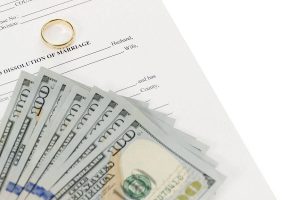Getting a New Jersey Divorce? Beware of Spousal Double Dipping

New Jersey courts allow double dipping: the nontitled spouse receives their share of business value, which is based on future income, and on top of that, receives a portion of that very same income as it is earned.
In a divorce case in which one spouse owns a business, the business is generally subject to equitable distribution; that is, each spouse receives their equitable share of the value of the business. Practically speaking, this does not mean that the business is sold and the proceeds divided but rather, that the nontitled spouse receives money or other property equal to their equitable share of the business value. The problem arises in the conflict between the income stream used to value the business and the income stream used to calculate spousal support.
This issue was recently addressed in the New York case of Gifford v. Gifford (2015 N.Y. App. Div. LEXIS 7829). In this case, the husband’s engineering services business was valued at $448,000 using a capitalized earnings approach and normalized earnings of $148,000. The court awarded approximately half of the value of the business to the wife, who received $210,000. The court also ordered monthly support starting at $6,000 and eventually declining to $800. In calculating this support, the court used the husband’s average total annual income of $332,000.
NY Court recognized double dipping
On appeal, the husband argued that the trial court was incorrect in utilizing annual income of $332,000 for purposes of calculating the maintenance award, without making an adjustment for the distributive award of the company.
Citing Grunfeld v. Grunfeld (94 N.Y. 2d 696, 705[2000]) and referring to the earnings capitalization method employed in valuing the company, the court stated, “This valuation method triggers the rule against double-counting income, which provides that once a court converts a specific stream of income into an asset, that income may no longer be calculated into the maintenance formula and payout.”
The essence of the Gifford decision and the New York law is if the nontitled spouse receives compensation for their equitable interest in the business, it is equivalent to having sold that interest and therefore, the nontitled spouse should not be entitled to receive future income from it. In siding with the husband, the appeals court treated the situation as if:
- The business were sold and the proceeds divided between the spouses;
- The husband then got a job with a $148,000 salary;
- Therefore spousal maintenance should be based on the $148,000 salary.
If the maintenance were based on $332,000, the wife would have received payment twice for the same asset: once in the division of assets and again in the receipt of maintenance payments.
New Jersey Courts allow the double dip
Unfortunately, New Jersey courts do not agree with this logic and do not recognize the problem with double dipping. In New Jersey, the normalized compensation used in valuing the business bears no relationship to the income used to calculate maintenance. The result is that in a New Jersey divorce, the nontitled spouse receives their share of business value, which is based on future income, and on top of that, receives a portion of that very same income as it is earned.



